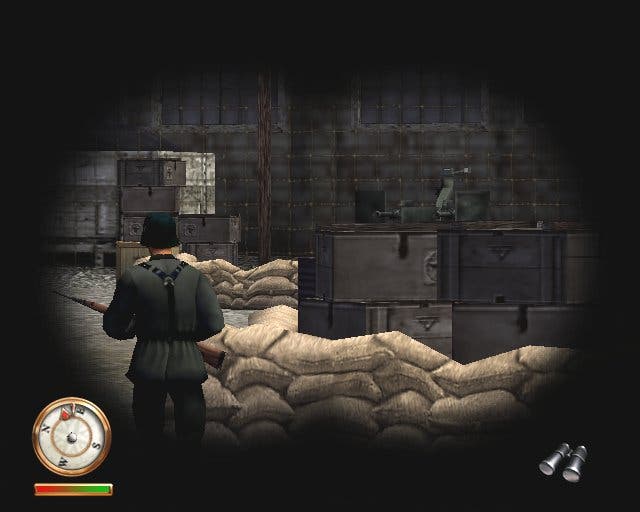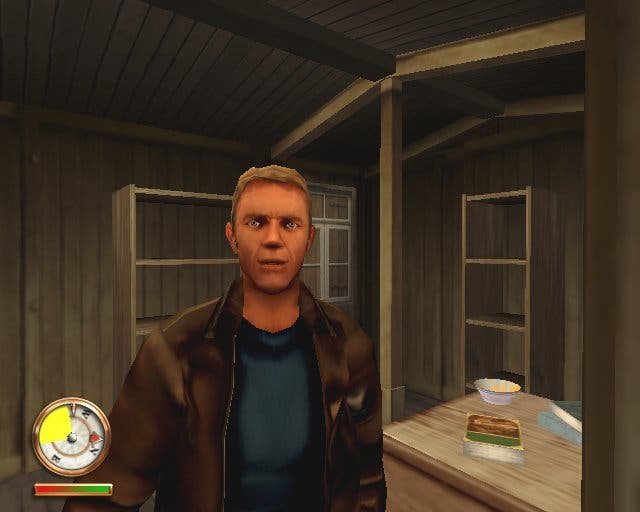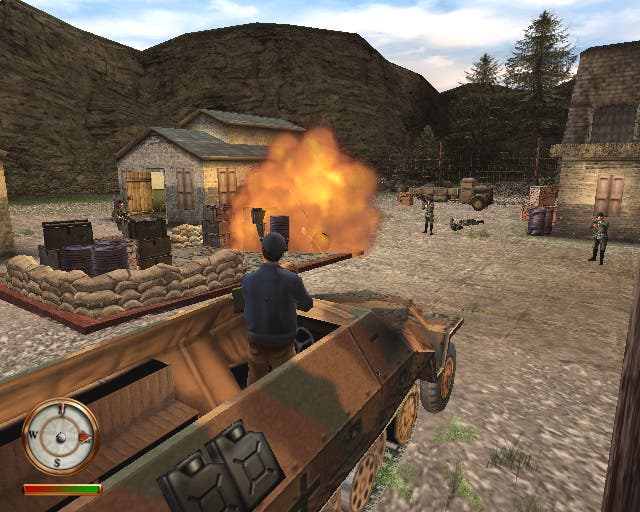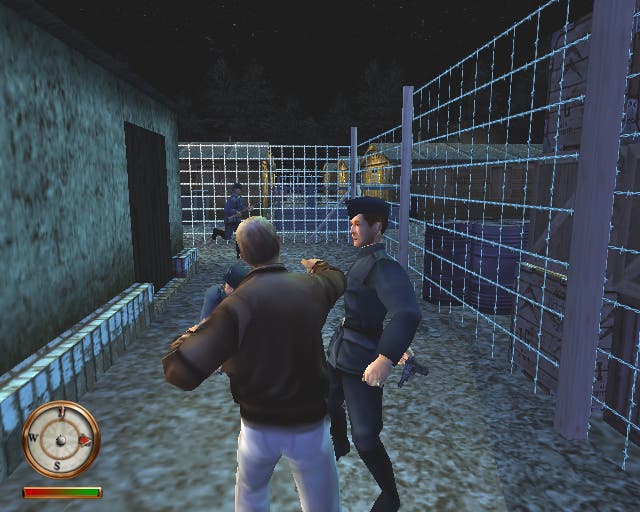The Great Escape
Ronan takes a spell in the cooler.
Solid Snake has a lot to answer for. And not just from Liquid's point of view either. On the one hand, he introduced us to the fabulous world of 'stealth espionage' and gave us one of the best games ever made, in Metal Gear Solid. On the other hand, his success - like all success in this industry - spawned a hideous batch of apostles; average game designers that would attempt to cash in on the new stealth revolution.
In all fairness to The Great Escape, it's certainly no clone of MGS. Nevertheless, its roots are undeniably linked to those of Kojima's masterpiece, because the closest thing we can compare it to - aside from Prisoner of War, of course - are Snake's VR missions.
So is The Great Escape worthy of such a comparison or, ahem, should it be locked up and the key thrown away? Don't bother skipping to the last section to find out, because our new 'Random Conclusion Generator' means the real verdict only appears if you read the whole way through. Honest.
Stop Camping

First off, it should be noted that while this game is obviously based on the old Steve McQueen movie of the same name, the reviewer still hasn't bothered his arse to watch it. So we're coming at this from a purely gaming point of view, which is as it should be anyway.
Just for those who don't know, however, the film was about a bunch of guys escaping from a POW camp in World War II. And, umm... [notable for its strong, ensemble cast and John Sturges' direction, McQueen's biking skills, the indelible baseball/cooler sequence, and the fact it's on TV every Christmas -Ed]
By all accounts, the game's plot follows events of the movie closely and even supposedly expands on the original idea. Great - but how does it play?
Well, it's third-person stealth. So you already know the basic gameplay, because you've seen it in MGS and Splinter Cell, plus it's been dodgily implemented into countless other titles too. Guards with limited fields of vision patrol around; alarms go off if you're seen; hiding in shadows is a necessity, blah blah. We know all this is fun if done properly. But that's a big if...
The Great Escape gets off to a poor start. Instead of throwing players straight into a nicely crafted tutorial, it throws up a terrible three-minute opening level instead. This basically introduces us to the game's first character, MacDonald - one of four - and serves little purpose other than to show why he abandoned his plane and parachuted into enemy territory.
Upon landing, Mac (he likes it when we call him that) gets captured by opposing forces and is taken to the game's first POW camp, and its first level.
Escape While You Can't!

The first thing we liked about The Great Escape was the control system. Using the standard left stick for movement / right stick for camera combo, it feels pretty comfortable right away. The X button is for actions and is context-sensitive, while pressing circle makes Mac crouch and holding L2 puts him into stealth mode. So no complaints there.
The first thing we disliked about The Great Escape, however, was the control system. In particular - the camera. For a game that requires you to hide behind crates, corners and various other such objects, it has an annoying habit of getting stuck on said objects. And if the camera can't move, then you've got to take a step backwards in order to see again. But as we're about to explain, unpredictable AI means quirks like this can often lead to capture.
The comparison with Snake's VR missions lies with TGE's core level design. For the most part, it focuses on simple A to B objectives, such as finding a uniform to infiltrate an office, where you must then get a grappling hook, after which you must switch off electricity, etc. It's neat, compact stuff. While attempting to do this, you've got to watch for the patroling guards, searchlights, dogs and other such enemy alerts. Get spotted by an enemy and two things can happen; one, your objective compass in the bottom left of the screen might turn yellow, showing that a guard is searching for you but won't shoot you - or two, it will turn red, showing that a guard is eager to gorge on your insides, or perhaps just open fire.
In yellow alert, the game's characters can hide in the shadows and soon the guards will make like goldfish and forget all about them. This is supposedly possible in red alert too, but more often than not once we hit red there was no going back.
Which leads to one of the game's major flaws: the manic AI. Unfortunately, TGE commits the cardinal error of not letting players know how far guards can see, or hear. There's no radar and there's no 'shadow' bar. This would actually be quite welcome if not for the fact that some guards notice you when you're within ten feet, while sometimes others don't notice if you walk right past them. It's true that the game does feature enemies of varying alertness, but even with guards of the same rank these problems appear.
On Guard

For a while, we took this to be part of the game's appeal. After all, while it might be frustrating at times, enemies that are a bit of an unknown quantity can only add to the overall suspense. And considering that the game does a decent job of 'sneaking' (It even has a special camera to peek through keyholes by pressing up on the D-pad) that can only be a good thing. On top of that, some interesting scripted events force the player to think quickly to stay out of the cooler.
Then, a few levels in, all hell breaks loose. The player is given access to pistols, grenades, sniper rifles and machine guns and the game just falls apart at the seams. What was shaping up to be a pretty absorbing title turns into a below-average mish-mash of action and stealth. Unlike Splinter Cell, The Great Escape doesn't let you go through most of the game without killing someone. In fact, you have to kill guards early on or you just can't progress.
This wouldn't be a problem if it had a decent combat system but, well, it doesn't. Once you turn and face an enemy, it takes a second or so for the game to automatically lock on to him, at which point you can fire by pressing R1. Strafing and shooting at the same time is not possible, while shooting in first-person mode is generally useless because you can't move, meaning you die... quickly.
A tough, unfriendly, clunky system is one thing, but forcing it on the player like this game does at times is just unforgivable. Especially considering that there are sometimes no alternatives to shooting. At one point, when we tried to pass two guards while dressed in enemy uniform, they asked for a pass. The obvious thing to do here is to offer players the choice of either killing the sentries and moving on, or finding the pass and progressing that way. However, the pass doesn't exist - you have to kill the guards. This leads to an endless red alert, which then leads to a stream of spawning guards later in the level, which leaves the player having to kill 20 men to escape the level. This is supposed to be a stealth game, remember?
On top of that, there are the stupid vehicular moments. Steal a truck, drive it clumsily through enemies; ride Steve McQueen's famous motorcycle, which handles like an intoxicated bull - what's the point? Well, to tie in with the movie, supposedly. But really, why be a jackass of all trades and master of none?
The Voice Of Reason

One thing The Great Escape has going for it is above average voice-acting. Three things it doesn't have going for it are graphics, presentation and originality.
So while the voices and cut-scenes are refreshingly short, sweet and to the point, the character models and general artwork are substandard. Funnily enough, this isn't really a major downside. For some reason, despite bland textures and a lack of any noticeable effects, The Great Escape feels... familiar somehow. Maybe it's because while the graphics are poor overall, they remain consistently so and remind us of a very good PSone game.
Regardless, even some nice aural touches (such as the sound of German opera coming from radios in the guard huts) can't save TGE from being an aesthetically average game.
There's No Escaping The Truth
Syntax Error. Random Conclusion Generator Failed. Reverting to original concluson.
Damn. Well, next time it'll be working.
The Great Escape, as you've probably gathered by now, is a severely flawed game. Yet somewhere - hidden underneath a terrible combat system, weird AI and an untrustworthy camera - there lies the frail skeleton of a good stealth game. If only Pivotal had concentrated entirely on this trait, then The Great Escape's early promise might well have made it worthy of recommending.
As it is, there's only one place this game is escaping to - the budget bin.







